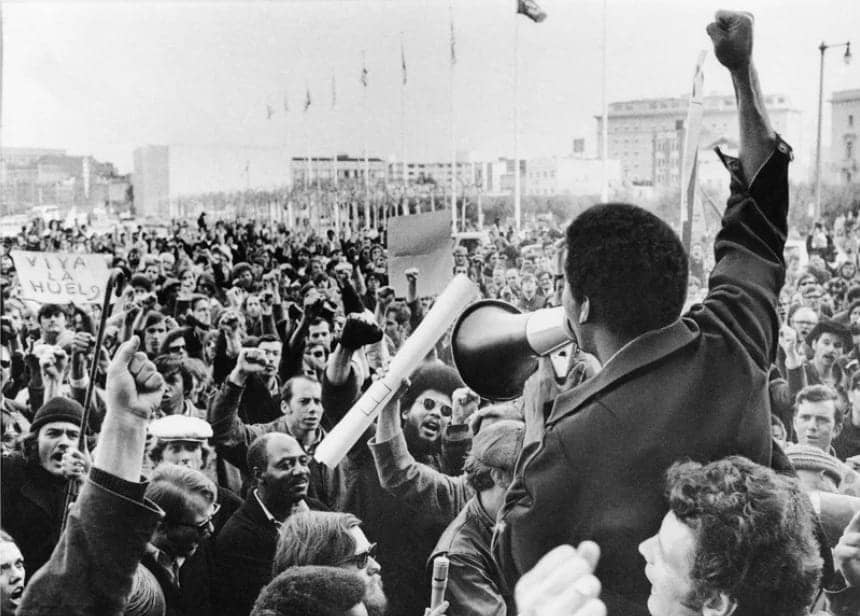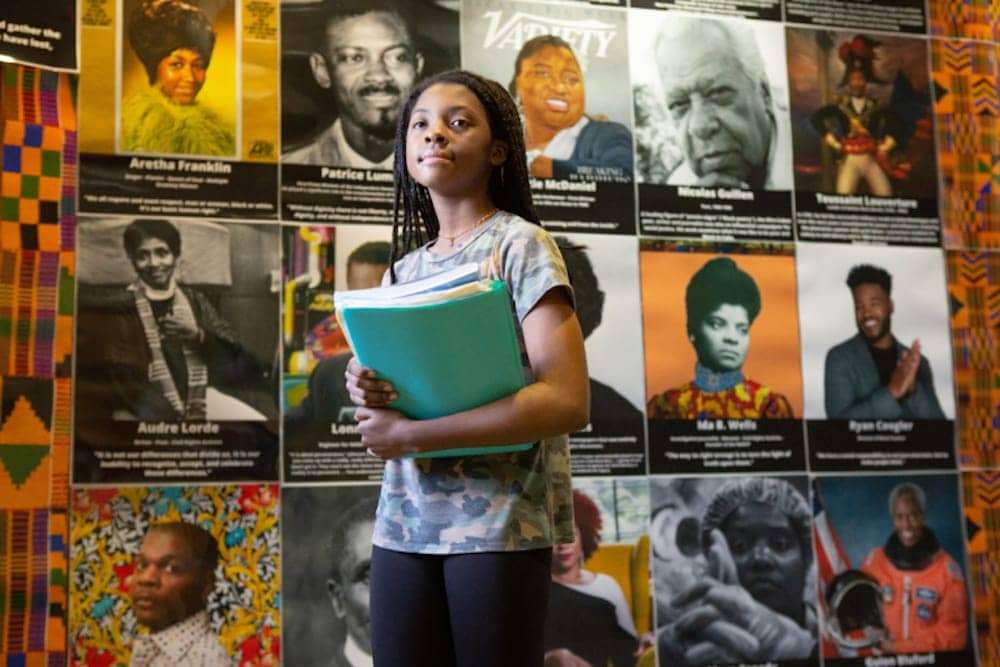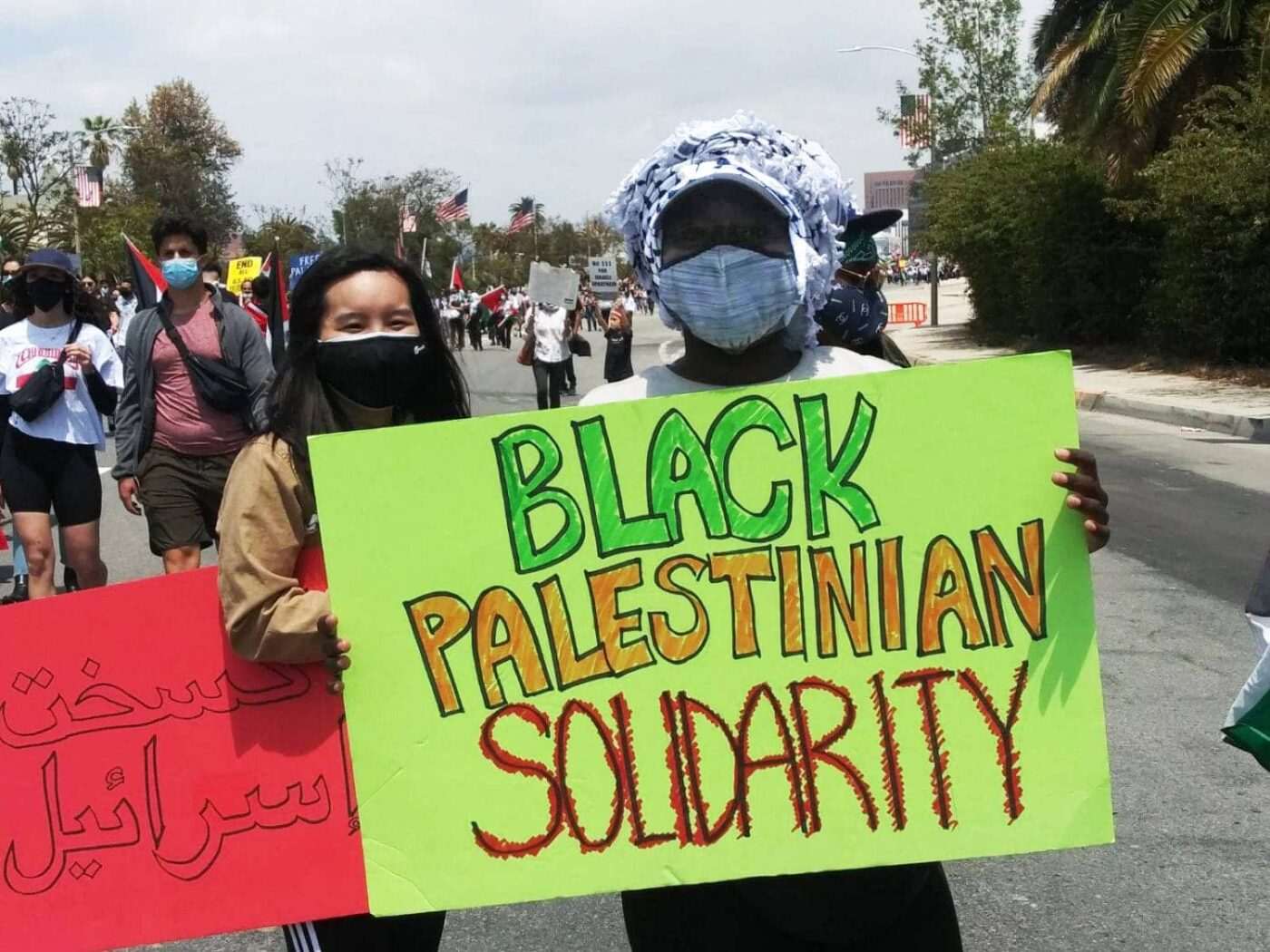
by Toshio Meronek, Ali Qureishi and Carla Schick
Black teachers and Black Student Unions led the battle in the 1960s to get Ethnic Studies taught at universities. They’re again leading the fight against today’s whitewashing of Ethnic Studies classes coming soon to California public high schools – new classes that will be required if you want to graduate.
Corporate media has given plenty of air to conservative lobbyists, who are promoting a deceptively named “Constructive Ethnic Studies” in order to spread confusion and to quash the original intentions of Ethnic Studies, which gave students the honest truth about the racist foundations of the United States and the fallout and generational harm it continues to cause.
The original Ethnic Studies was too real and potentially damaging for conservatives who are obsessed with preserving the status quo. These rightwing forces recently created a whitewashing nonprofit with the moniker “The Alliance for Constructive Ethnic Studies,” and they’re making headway in other states, including four where race and ethnicity are outlawed from discussion in the classroom.
Arab Americans have been the number one target of the politician whisperers, who scraped any mention of the word “Palestine” from the first draft of the Ethnic Studies curriculum text. The Bay’s progressive reputation took a hit when social media platforms including Facebook, Twitter and Zoom censored San Francisco State University and its solo Middle Eastern Studies professor Rabab Abdulhadi.

Abdulhadi’s social media has faced censorship for just mentioning Palestine and trolls online have made her a racist target, long before she attempted to host an online discussion that included the Palestinian freedom fighter Leila Khaled.
As protesters in the Bay and beyond rage against the Israeli government’s campaign of genocide against Palestinians, the issue of what makes it into high school textbooks in California – whose stories are worthy of being told and whose are not – is being decided by politicians and lobbyists in Sacramento.
The US today budgets about $4 billion per year in military aid funding to Israel – more than we send any other country on the globe. In return, Israel has invited thousands of police officers to fly across the Atlantic for a paid vacation and some – very literally – killer training.
Many Bay Area locals remember the long-fought but eventually successful campaign to Stop Urban Shield, an Oakland-hosted convention militarizing the local police, which since 2007 had been held in partnership with Israeli law enforcement and Israeli government-backed nonprofits. Local law enforcement agencies such as the Oakland Police Department have been some of the most consistent attendees of the so-called “homeland security” training exchanges.
The obscured history of Black-Palestinian solidarity
High school students might not know that solidarity between US Black revolutionaries and Palestinian revolutionaries is closely intertwined and based in years and years of mutual support. Back in 1964, Malcolm X wrote that the pro-Israel “Zionist argument to justify Israel’s present occupation of Arab Palestine has no intelligent or legal basis” and that Israel was promoting itself in an underhanded way:
“The continued low standard of living in the Arab world has been skillfully used by the Zionist propagandists to make it appear to the Africans that the Arab leaders are not intellectually or technically qualified to lift the living standard of their people … thus, indirectly ‘inducing’ Africans to turn away from the Arabs and towards the Israelis … They cripple the bird’s wing and then condemn it for not flying as fast as they.”

Black South Africans have been some of the most vocal opponents of Israel. Until Nelson Mandela and his allies overthrew the apartheid government in 1994, for decades South Africa’s European-led apartheid government enforced laws that forcibly segregated Black people from whites as late as the 1990s.
When Mandela and his political party, the African National Congress, overthrew their white oppressors, one of the early statements Mandela made was to throw support behind the Palestinian freedom struggle: “Our freedom is incomplete without the freedom of the Palestinians,” he said.
More recently, Mandela’s grandson Zwelivelile Mandela visited Palestine in 2019, stating that the Israeli government’s treatment of Palestinians as “second-class citizens” has created an apartheid like South Africa’s.
The younger Mandela explained that “the design of the Israeli government for generations [has been] to get rid of the Palestinians and make them go away in various ways, shapes and forms.” What has this onslaught looked like?
Since 2008, the United Nations has recorded 22 Palestinian deaths for every Israeli death; each year, hundreds of Palestinian homes are demolished to make way for Israeli settlers; and many Black scholars, from Mumia Abu Jamal to Angela Davis, have called Israel’s Gaza strip “the largest open air prison” in the entire world.
Students who have taken Ethnic Studies classes in their high schools have often said it was their favorite class because it taught them a more truthful story of the world.
Given the intertwining histories of struggle, it was no surprise that during the COVID-19 pandemic, Black students and educators spoke out strongly against the conservative lobby’s editing of Ethnic Studies curriculum into what is now barely a skeleton of its original, honest telling of the history of US racism and cultural and economic disenfranchisement of Black people and other people of color.
Those who spoke out include Black Bay Area figures who are still alive today to tell the wild story of when Ethnic Studies was a national threat and when Black Student Unions led the fight against people like Hoover and Reagan.
Will lobbyists decide what makes the history books?
It’s the history of American History class: Wealthy groups with political clout want to make the decisions about what histories students will learn. They want to have the final word on what history and historical figures are important enough to include in the final draft.
Despite the many statements on paper and in public hearings received from the community, on March 18 California’s Department of Education decided the state’s model Ethnic Studies is sufficiently whitewashed to send to the governor’s office for approval.
In September 2020, Gov. Newsom vetoed a version of California’s proposed Ethnic Studies curriculum as a result of pressure from those conservative groups just mentioned. Now, the state’s new teaching guides – which will be distributed to school districts throughout the state in 2025 – are particularly focused on invisibilizing Arab American students who are returning to campuses that have been closed due to COVID to face more bullying by non-Arab students and teachers, surveillance by Homeland Security, and to be attacked and killed by bigots emboldened by Islamophobic public relations campaigns.
So far, these conservative groups have been successful to a point. But they haven’t won entirely. In February, the panel of 20 teachers originally tasked with coming up with the curriculum, all nonwhite from different backgrounds, demanded their names be removed from the document they themselves had written. Their statement, posted on the site Save Arab American Studies, describes how “white supremacist, rightwing conservatives” and “organizations now claiming ‘Ethnic Studies’ expertise” will decide what makes the textbooks.
In the new Ethnic Studies curriculum, “essential Ethnic Studies terminology, including the definition of race, has been eliminated, incorrectly defined or moved to the footnotes.”
The panel of 20 painted the picture of SF State University in the 1960s, when Black Student Union members went on strike for five months – a strike that eventually spread to campuses across the country and formed a coalition including student groups repping Filipinx, Latinx and Native Americans.
March’s decision by the Board of Education was condemned by anti-racist groups across the state, including the Black youth-led Urban Peace Movement, whose statement to California Department of Education head Tony Thurmond described how in the new Ethnic Studies curriculum, “essential Ethnic Studies terminology, including the definition of race, has been eliminated, incorrectly defined or moved to the footnotes.”
Students who have taken Ethnic Studies classes in their high schools have often said it was their favorite class because it taught them a more truthful story of the world. We, too, know it is important to be truthful in telling the history of Black and Brown communities in the US and around the world. For these reasons, we are in opposition to the current version of the ESMC (Ethnic Studies Model Curriculum).
Coleman Advocates for Children and Youth was part of the coalition pushing for Ethnic Studies classes in high schools at the San Francisco Unified School District level way back in 2010. In their own letter to Thurmond, they wrote:
“We share the anger of our Arab siblings that their history and community has been relegated to an appendix … (A)ll children and families deserve access to high quality education, living wage jobs, family-supporting benefits, affordable housing and a voice in the decisions that affect us.
“While we work to increase opportunity for all young people in San Francisco, our primary focus is fighting to advance rights, safety and full inclusion of low-income people of color. We know that quality education is key to future economic security, individual well-being and social participation.”
We are also concerned that the Ethnic Studies educators who wrote the original ESMC have been sidelined, while politicians and lobbyists have wielded the most influence in what revisions get made. The sidelining of the original committee echoes an all-too-familiar experience amongst people of color of having our expertise denied.
Like today, at that time the idea of college kids learning about race was not all right with the conservative power structure. The audacity of the strikers pissed off the man who was then governor of California, Ronald Reagan, so much that he declared “a state of extreme emergency” and ordered campus, city, county and highway patrol cops to arrest and teargas many of the strikers.
After the new, misleading curriculum was approved, some of the most widely known college-level academics wrote a letter of support drawing connections between the high school and college battles, including Cathy Cohen, Marc Lamont Hill, Robin DG Kelley, Barbara Ransby and Cornel West.
President Richard Nixon sent in the US National Guard to take back occupied buildings at San Francisco State and UC Berkeley. The FBI paid students to spy on their classmates who were fighting for Ethnic Studies. Despite what they were up against, strikers eventually backed college administrators into a corner they could only get out of by meeting strikers’ demands, like hiring more professors of color and opening up Ethnic Studies departments across the country.
After the new, misleading curriculum was approved, some of the most widely known college-level academics wrote a letter of support drawing connections between the high school and college battles, including Cathy Cohen, Marc Lamont Hill, Robin DG Kelley, Barbara Ransby and Cornel West.
Intersectionality and layers of oppression – questions that don’t come up in a lot of teacher’s guides and textbooks – highlight the importance of Ethnic Studies curriculum that isn’t written by lobby groups. The writers of this article are queer and trans, but we can’t isolate that from our different class statuses, disabilities and, of course, ethnicities.
A current Arab American 18-year-old San Francisco Unified high school student, Safaa, described to us something that we all relate to, despite our different identities and ages (28-55).
“As a first-generation Muslim American, it’s really important to me in high school to see how others learn about my ethnics because it really does make you feel validated, not only as a person, but it makes you feel really good to be validated amongst your peers.
“It’s important to be educated and expand your knowledge on these types of topics because you’re actually educated yourself and know what you’re talking about when discussing topics around Islam or whatever rather than be ignorant and making your own assumptions on other people opinions. That’s being closed-minded and biased.”
In fall 2017, if you went to public school in California, your classes and textbooks probably became a bit more queer with the introduction of mandated LGBT social studies. The 20-plus versions we’ve looked at – seven publishers produce the state-approved textbooks; there are many more online histories tailored for teachers – have a commonality: They almost exclusively focus on white, gay, cisgender and nondisabled people.
It looks like an attempt to silence the experiences of marginalized people by a state that wants to look progressive on education.
The state sent public districts materials to guide teachers through the process. That meant if a teacher who knew little about LGBT Studies – maybe even harbored some hostility toward queer people – they only had this one document to start from. Of course, teachers have some space to include their own interpretations and add to the model curriculum, but many don’t have the motivation to stray beyond the basics of what the state sends over.
One of us is a former educator from the East Bay who can relate to San Francisco-based public school teacher Ms. A. – who asked her name be shortened because of the controversy around Palestine, specifically – who explained to us: “When I first started teaching as a teacher with a brand new course, it was difficult to find lessons to adapt, and I based a lot of my classes on available curriculum.”
When Palestinian lives get written out of the curriculum, and the people controlling the narrative want to – subtly or not – force a white- and Zionist-centric Ethnic Studies on public school students who might’ve seen glimpses of themselves in the original, broader curriculum, it looks like an attempt to silence the experiences of marginalized people by a state that wants to look progressive on education.
Thanks to racist pro-Israel groups like the Anti-Defamation League (ADL), Arab American Studies has now been edited down into: Asian American & Pacific Islander Studies. Zionist groups also successfully lobbied to remove the word “Palestine,” the BDS (Boycott, Divest and Sanctions) Movement supporting Palestinian lives, and references to the first Palestinian American congressperson in the US, Rashida Tlaib.
Arab American Studies also now lacks the original’s mention of colonialism in the Arab world, and the relationship between Islamophobia and US foreign policy.
The scope of the revisions go well beyond Arab American Studies, removing the concept of capitalism as a system that reinforces racial and ethnic oppression. The California Teachers Association, the Center for Constitutional Rights, Black Lives Matter Global Network, Jewish Voice for Peace and Queers Undermining Israeli Terrorism are among the other social justice groups that publicly support the original version.
Ethnic Studies is important because it frames how we think about social justice and how racism structures the world we live in. Superficial lessons on “multiculturalism” and “diversity” without the context of struggle by marginalized people undermines the critical intent of the 20 teachers who took their names off the curriculum – who are, by the way, still committed to developing their original version for teachers who want to use it in their own classrooms.
But right now, the history that most public students will – and won’t – learn is still going to be decided by powerful, connected people who graduated from expensive private schools and would never consider sending their own kids to a public high school.
Toshio Meronek’s past writing appears at Truthout and In These Time, in addition to several anthologies, including “Captive Genders: Trans Embodiment and the Prison Industrial Complex.” “Miss Major Speaks,” a book co-authored with activist Miss Major Griffin-Gracy will be out late 2021.
Ali Qureishi was born in and lives in the San Francisco Bay Area. They are of mixed Arab and Afghan descent and passionate about local politics and social justice.
Carla Schick is a retired public school teacher and current support provider for new teachers and is active in the California Teachers Association as an openly queer, radical member of QUIT! (Queers Undermining Israeli Terrorism) and member of the editorial collective of Ultraviolet, the widest circulating newspaper centering LGBTQ prisoners.





